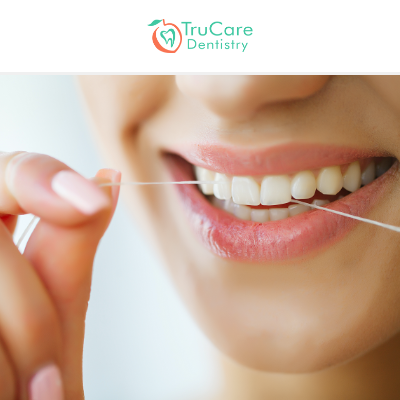
Food particles remain stuck between teeth despite rinsing your mouth with water after eating. Even your toothbrush may not reach the same. Neglecting these particles and plaque accumulation can result in dental problems, including gum disease. And this is where flossing enters the picture.
At TruCare Dentistry in Roswell, GA, we believe flossing after every meal can help in improving oral hygiene. It’s the best way to protect gum tissues and stop them from becoming sensitive or painful.
Let’s take a detailed look at the overall benefits:
Significance of flossing
Dentists worldwide urge patients to add flossing to their daily oral hygiene routine. As per the data released by the ADA, a mere 16 percent of adults in the US floss their teeth daily. Unfortunately, most patients are not even aware of the benefits offered by flossing.
Brushing helps you clean three sides of teeth out of five. Particles stuck between two teeth can turn into plaque within a few days. Flossing is the only option to clean these parts and ensure there is no harmful bacteria accumulation.
You can easily prevent gum disease and tooth decay by flossing. The habit also promotes a healthy diet, as flossing after every meal will control your unnecessary snacking routine.
The link between flossing and cognitive decline
What’s cognitive health? No worries, don’t open Google search; the definition is simple. Your ability to think, learn, and remember comes under cognitive health. Lifestyle, environmental and genetic factors influence these abilities.
Research work has already proved how your oral health can affect your overall well-being. Now, a recently published study has established a clear link between oral health habits and cognitive health. Believe it or not, but simply flossing your teeth can help in preventing dementia and cognitive impairment.
Scientists from NYU Rory Meyers College of Nursing conducted a study. It concluded there’s a connection between cognitive decline and poor oral health. The JAMDA-Journal of Post-Acute and Long-Term Care Medicine had also published the concerned research.
The study’s author, Professor Bei Wu, recently interacted with journalists.
While sharing insights from the study, Wu said 34,074 adults participated in 14 different evaluations exploring the link between cognitive impairment and tooth loss.
Adults with tooth loss were 1.28 times more prone to dementia and faced 1.48 times greater cognitive impairment risk than persons without dental issues.
The analysis pointed out the risk of developing cognitive impairment grows with each additional missing tooth. Good oral hygiene habits, including basics like flossing and brushing, can help prevent the same.
The research also puts a spotlight on the importance of dentures and preventative treatment. The study points out that participants who opted for preventive dentistry and dentures were less prone to cognitive decline.
The logic is simple, older adults with tooth loss cannot eat food items with nutrients crucial for brain health. On the other side, adults who use dentures post tooth loss can eat a healthy diet. So, those without dentures remain at risk.
There is an immediate need to build awareness about the significance of oral health, Wu concluded.
Do it the right way
Several individuals fail to floss correctly. They cannot get the best results out of the activity.
Do you think the right way to get those food particles out is by flossing up and down? Well, that’s the wrong way because the floss won’t reach the areas below the gumline and sides of the teeth.
Here are quick tips to assist in proper flossing:
- Use at least 18 inches long floss string
- Always guide the floss between two teeth with your index fingers
- Floss in a zig-zag motion
- Slide the floss under the gumline as well
- Floss all your teeth daily
Flossing can be painful and time-consuming initially. But why not invest a few minutes daily for the sake of good health and its impact on brain function?
Let your dentist choose flossing tools based on your oral health. They can recommend the best option from the following ones:
- Woven string floss with nylon fiber
- Monofilament string floss
- Waxed floss
- Dental tape
- Water flosser
- Traditional string floss
- Air flossers
Are you looking for the most preferred and suitable option? Waxed floss happens to be the most appreciated one.
Dentists prescribe air and water flossers to patients who do not feel comfortable using traditional flossers. Tiny water droplets do the magic and remove particles within seconds.
To conclude:
Are you planning to use floss for the first time? It will help if you remain extremely careful as your gums might bleed. But remember, this might happen just once. Flossing is the easiest way to protect your teeth from cavities.
If you are in Roswell (GA), feel free to fix an appointment at TruCare dentistry. Our experts will recommend the best type of floss after examining your teeth.
